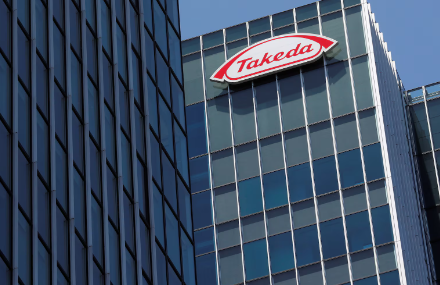Takeda Pharmaceutical Company: A Global Leader in Healthcare

Takeda Pharmaceutical Company Limited (Takeda Yakuhin Kōgyō kabushiki gaisha) is a prominent Japanese multinational pharmaceutical corporation. It ranks as the third largest pharmaceutical company in Asia, following Sinopharm and Shanghai Pharmaceuticals, and is recognized as one of the top 20 pharmaceutical companies globally by revenue, moving into the top 10 after its merger with Shire. With over 49,578 employees worldwide, Takeda generated US$19.299 billion in revenue in the fiscal year 2018.
History
Founding and Early Acquisitions (1781–2010)
Takeda Pharmaceuticals was founded in 1781 and incorporated on January 29, 1925. One of its key products is Actos (pioglitazone), a medication for type 2 diabetes that was launched in 1999. In February 2005, Takeda acquired Syrrx, a San Diego-based company specializing in high-throughput X-ray crystallography, for US$270 million.
In February 2008, Takeda acquired the Japanese operations of Amgen, gaining rights to several pipeline candidates for the Japanese market. Later that year, it acquired Millennium Pharmaceuticals, a Massachusetts-based company focused on cancer drug research, for US$8.8 billion, which included the cancer drug Velcade and a portfolio of oncology, inflammation, and cardiovascular therapies. Millennium operates as an independent subsidiary within Takeda. The company also entered a partnership with Alnylam Pharmaceuticals for RNAi technology.
Further Expansion and Research (2011–Present)
In September 2011, Takeda acquired Nycomed for €9.6 billion and continued its expansion by purchasing Brazilian pharmaceutical company Multilab for R$540 million in May 2012. Later that year, it acquired URL Pharma for US$800 million.
Takeda announced collaborations with BioMotiv and MacroGenics in 2014, focusing on developing new compounds for autoimmune diseases. In 2015, the company sold its respiratory drug business to AstraZeneca for $575 million and received FDA approval for Ixazomib for multiple myeloma treatment.
In December 2016, Takeda spun off its neuroscience division into a joint venture called Cerevance. Subsequent acquisitions included Ariad Pharmaceuticals in 2017 and TiGenix in 2018, enhancing its oncology portfolio. The major acquisition of Shire for over US$50 billion in 2019 marked a significant milestone.
In 2020, Takeda announced a research partnership with MIT to advance AI in healthcare and divested non-core products in Latin America for $825 million.
In 2021, Takeda acquired Maverick Therapeutics and GammaDelta Therapeutics, expanding its pipeline in immunotherapy. The company continued to grow with acquisitions in 2022, including Adaptate Biotherapeutics and Nimbus Lakshmi, further bolstering its innovative capabilities.
Most recently, in February 2024, Takeda received FDA approval for Eohilia, the first oral treatment for allergic inflammation of the esophagus for patients aged 11 and older. However, in May 2024, the company announced layoffs of 641 employees in Massachusetts as part of a restructuring plan, affecting locations in Cambridge and Lexington.
AP Pharmaceuticals (1977–2008)
Overview
In 1977, Takeda Pharmaceutical Company entered the U.S. market through a joint venture with Abbott Laboratories, known as TAP Pharmaceuticals. This collaboration resulted in the launch of several successful drugs, including Lupron (leuprorelin) in 1985 and Prevacid (lansoprazole) in 1995.
In 2001, TAP Pharmaceuticals faced legal issues when the U.S. Department of Justice and the Illinois attorney general charged the company with illegal marketing practices related to Lupron. This led to a significant settlement of $875 million, marking one of the largest pharmaceutical settlements in history.
By March 2008, Takeda and Abbott announced the conclusion of their 30-year joint venture. As a result, Abbott acquired the U.S. rights to Lupron and its support staff, while Takeda retained rights to Prevacid and TAP’s pipeline candidates. This transition also increased Takeda’s workforce by approximately 3,000 employees.
Acquisition History
Takeda has a long history of strategic acquisitions to enhance its portfolio:
- Syrrx (Acquired in 2005)
- Paradigm Therapeutics (UK) Ltd. (Acquired in 2007)
- Millennium Pharmaceuticals (Acquired in 2008)
- COR Therapeutics (Acquired in 2002)
- Nycomed (Acquired in 2011)
- Ariad Pharmaceuticals (Acquired in 2017)
- Shire plc (Founded in 1986, Acquired in 2019)
Notable smaller acquisitions include URL Pharma (2012), Cerevance (spun off in 2016), and GammaDelta Therapeutics (Acquired in 2021).
Divestments
In recent years, Takeda has also undertaken several divestments to streamline its operations:
- In May 2019, it sold its Xiidra dry-eye drug business to Novartis for $5.3 billion.
- In November 2019, the company agreed to sell its over-the-counter and prescription drug businesses in several countries to Stada Arzneimittel for $660 million.
- In June 2020, it divested 18 over-the-counter and prescription drugs in the Asia-Pacific region to Celltrion for $278 million.
Global Operations
Takeda operates major facilities in Japan, with headquarters located in Osaka and Tokyo. Its U.S. subsidiary is based in Cambridge, Massachusetts, while all global operations outside Japan and the U.S. are centered in Opfikon (Zurich), Switzerland. The company maintains research and development sites across Japan, the U.S., the U.K., and Singapore, along with manufacturing facilities worldwide.
Legal Issues
In April 2015, Takeda agreed to a settlement of $2.37 billion for claims from approximately 9,000 individuals alleging that pioglitazone, a diabetes medication, caused bladder cancer. The settlement fund is expected to provide an average of $267,000 per claimant, depending on various factors such as dosage and injury extent. In a separate case, a jury initially awarded $9 billion in punitive damages to a plaintiff who claimed that Takeda concealed cancer risks associated with their medication; however, this amount was later reduced to $26 million by a judge.
Corporate Responsibility
Takeda is a corporate partner of the Human Rights Campaign, a prominent advocacy organization focused on LGBTQ+ rights, showcasing its commitment to social responsibility and activism.


































